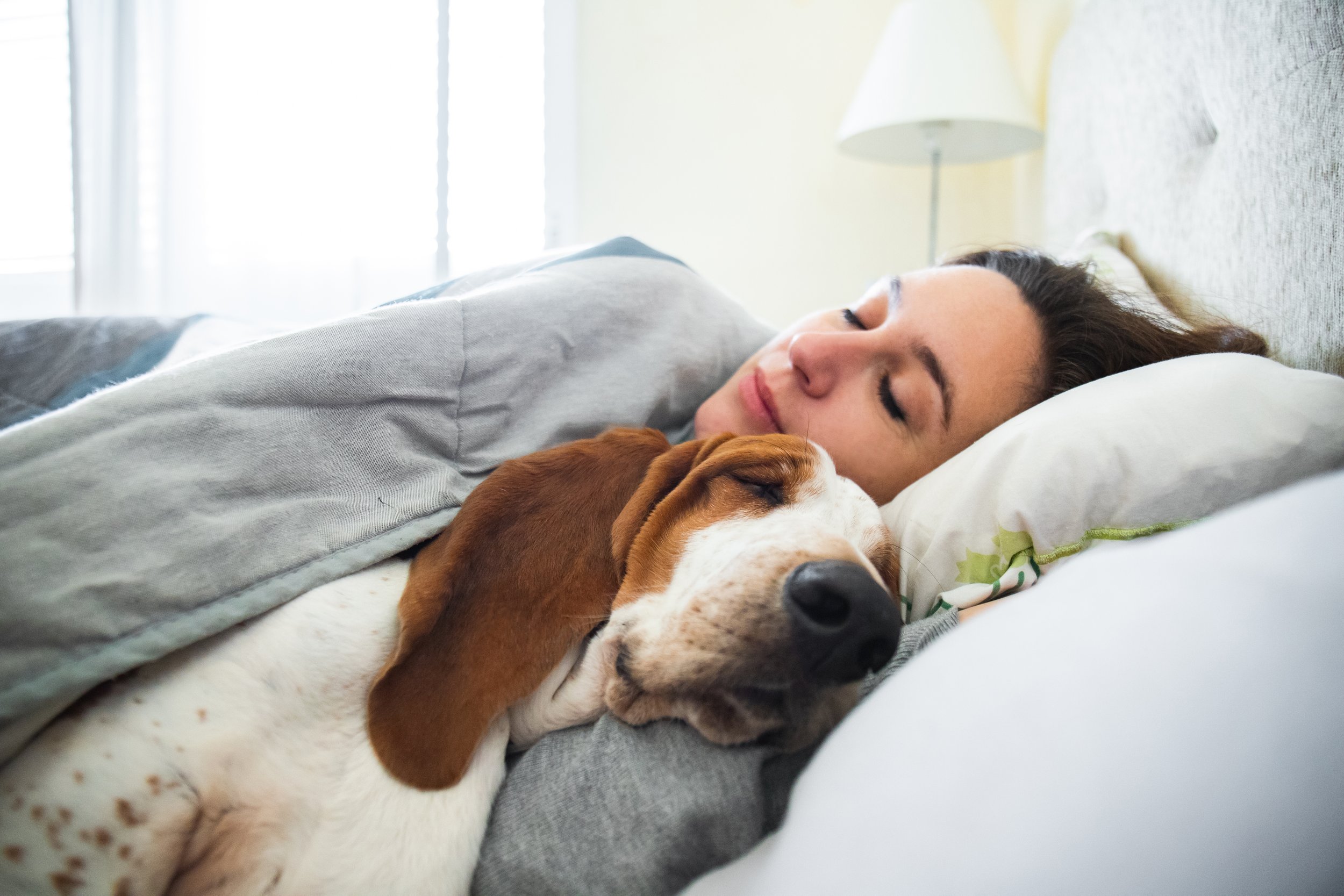Let Sleeping Dogs Lie (really)
Daniel Rodriguez/stock.adobe.com
We’ve heard this phrase before. And most of us have come to understand that it means not to dig up unnecessary trouble. For instance, it might be best simply not to ask a question that’s going to stir up turmoil in the family. Just “leave it alone.” (Note: I’m a dog trainer, not a family counselor - don’t take my advice about how to run a family! I’m just trying to explain the meaning of the idiom.)
But sometimes, we should take it literally. Don’t bother a sleeping dog. Doing so risks getting bitten.
I hear about this from time to time with my clients. Heck, I even had this problem with my own dog, Juno. She’d be cuddled next to me on the sofa at night, snoring gently. I’d be doing the crossword puzzle on my iPad and sort of watching something on tv. Time would pass and she’d be really out after a long day of adventures. But eventually, I’d decide to go to bed. So, I’d gently touch her as I’d say her name. And my sweet little happy dog would wake up with a startle and snap at me with a snarl.
Some of my clients aren’t as lucky as I was. Some have been bitten pretty seriously (requiring stitches).
But as my mentor and friend, Jean Donaldson, said just today, “we get it, it's heartbreaking, but here's the thing: don't take it personally - everybody argues and so do dogs.” Some dogs don’t like to be bothered while they are sleeping and they get grumpy. Other dogs aren’t grumpy as much as scared or surprised - or both. I think that’s what this is much of the time: a startle response.
We’ve all likely seen videos of people punching a friend who’d jumped out from behind a door to scare them. They weren’t trying to hurt anyone - they were acting in self defense after being startled. It’s not that punching your friend in the nose is okay, but no one could possibly judge you harshly after such an incident. Most would blame the person who scared you. I remember as a kid, we had a friend of the family who warned me, “if I’m ever napping and you need to wake me up, don’t touch me. I’ll wake up swinging and I REALLY don’t want to hurt you. I just can’t help myself. It’s just what I do.” On the rare occasion I needed to wake him up, I did so from the opposite side of the room by calling his name. I never touched him.
And that’s what sometimes happens with our dogs who are startled by our attempt to wake them. They are reacting out of pure instinct from the surprise.
It’s certainly hard NOT to take it personally. I know I did. But then I remembered times when I’d been startled and I felt bad for scaring Juno instead of feeling angry at her for her reaction.
But let’s be realistic here: not every dog carries the same risk. Big dogs who bite hard when startled awake are a bigger risk than a big dog who just growls. And big dogs are generally a bigger risk than small dogs simply because of the size of their teeth (though small dogs can inflict painful and serious bites too). So, be careful about waking a dog from a deep sleep.
If you have a dog who bites when startled awake, there’s some good news - this behavior can often be changed. And in the meantime, it can be managed.
From a management perspective, dogs who bite when startled awake simply shouldn’t be allowed to sleep with you. A person rolling over could startle a dog awake in bed in the middle of the night and the dog might inflict a painful bite to a groggy person who doesn’t have any opportunity to move away. Simply because of positioning, the bite could land on a face. Or on a child. So, these dogs shouldn’t be in bed with us (despite the cute picture I chose for this post). The same is true for sleeping next to us on the couch. This isn’t about anything worrisome like “dominance” (like you’ll read about in so many places). It’s just about a dog who reacts by biting when startled awake. Wake the dog only if you must and only by calling their name or gently clapping your hands. The goal is to avoid scaring the pup in the first place and secondarily, not being within biting distance in case you were unsuccessful.
Training is also an option for a longer-term solution that might allow you to once again cuddle in bed all night. I’ve helped several dog owners with this problem. And I was able to teach Juno not to be bothered when I wake her up. She routinely falls asleep next to us on the sofa, then wakes up gently when it’s time for us to move to the bedroom (where she sleeps right next to us without us fearing about being bitten in the middle of the night). She may grumble (growl) if we interrupt her sleep by rolling over - and who can blame her? I grumble about that too.
Because bites are potentially serious, I’m not going to try to list generic steps for training this. I encourage you to contact your trusted force-free trainer to help you with this problem. In the meantime, management is the safest bet.
And please, do try not to take it personally. I’ll bet your dog didn’t mean it that way.
Cool piece of trivia: we don’t know who said “Let Sleeping Dogs Lie” the first time, but it’s been around for a LONG time. One early version was Chaucer’s who said in the 1380s…
It is not good a sleepynge hound to wake”
